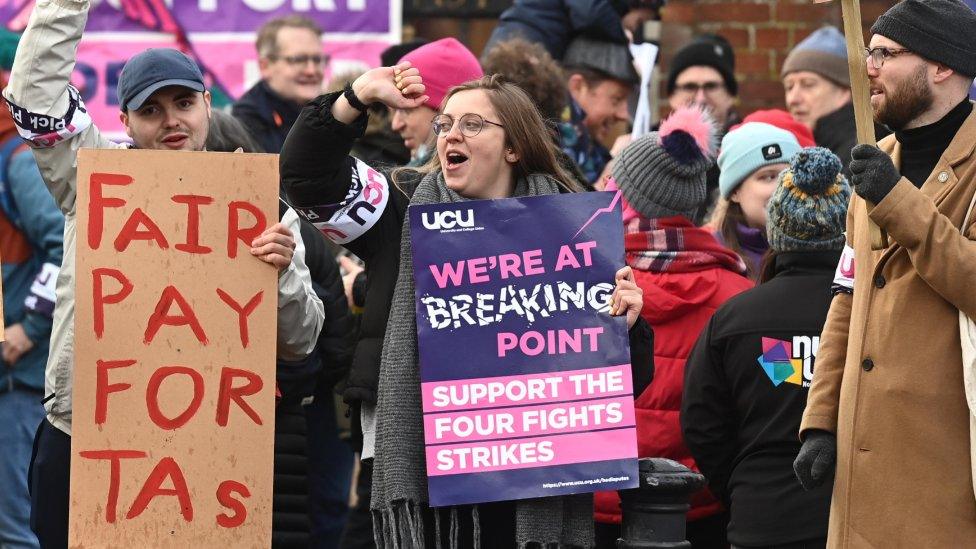Ulster and Queen's University staff begin 18 days of strike action
- Published
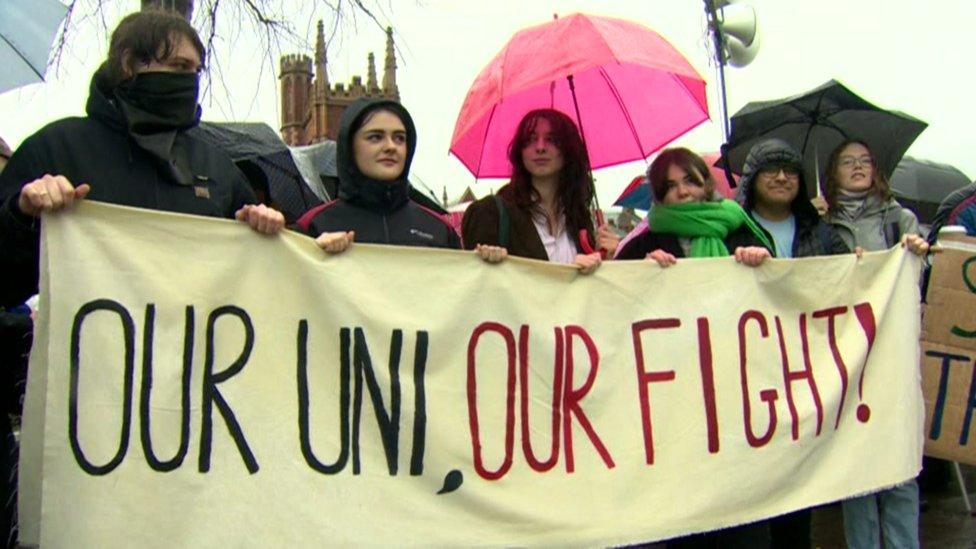
Students joined staff on the picket line outside Queen's University in Belfast
Some staff at Queen's University Belfast (QUB) and Ulster University (UU) are taking the first of 18 planned days of strike action on Wednesday.
University and College Union (UCU) members are striking in dispute over pay, working conditions and pensions.
The union is planning 18 days of "unprecedented" walkouts at about 150 universities during February and March.
A lecturer on the picket line at Ulster University's Magee campus on Wednesday said "none of us want to be here".
At Queen's University in Belfast some students joined striking staff.
It comes as mass strike action is taking place throughout the UK.
Universities UK, has called the action "disappointing".
The dispute between the UCU and the university employers has been a long-running one.
UCU members have been out on strike a number of times in recent years, most recently for three days in November 2022.

On the picket line at Magee Campus, Mike McBride, BBC News NI
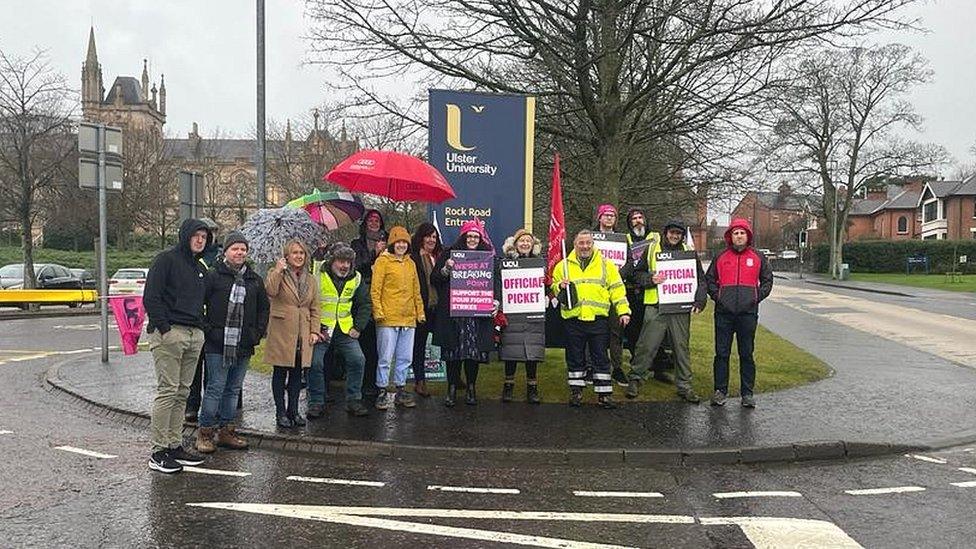
The picket line at Ulster University's Magee campus on Wednesday
The weather has certainly not dampened spirits outside University of Ulster's Magee campus in Londonderry.
A crowd of about 20 people have braved the wind and the rain over what they say are "unacceptable working conditions" and "inadequate pay".
Members at the picket say they have taken a real-term pay cut over the years and now, coupled with the cost-of-living crisis, say they have simply had enough.
One lecturer says that the workload was impacting their families.

Dr Damian Gallagher, who works in Ulster University's business school in Derry, said: "We're all at breaking point and we believe higher education is at breaking point and students aren't getting the experience they deserve."
Goretti Horgan, a lecturer at the university, said she felt compelled to take industrial action.
"When I started in this university 20 years ago you were able to get a couple of weeks' holiday every year in the summer - now you struggle to even get a week of holiday," she said.
"Our Christmas is taken over by marking, the workload is now that bad that members of our family are even complaining about how many hours that we are working."
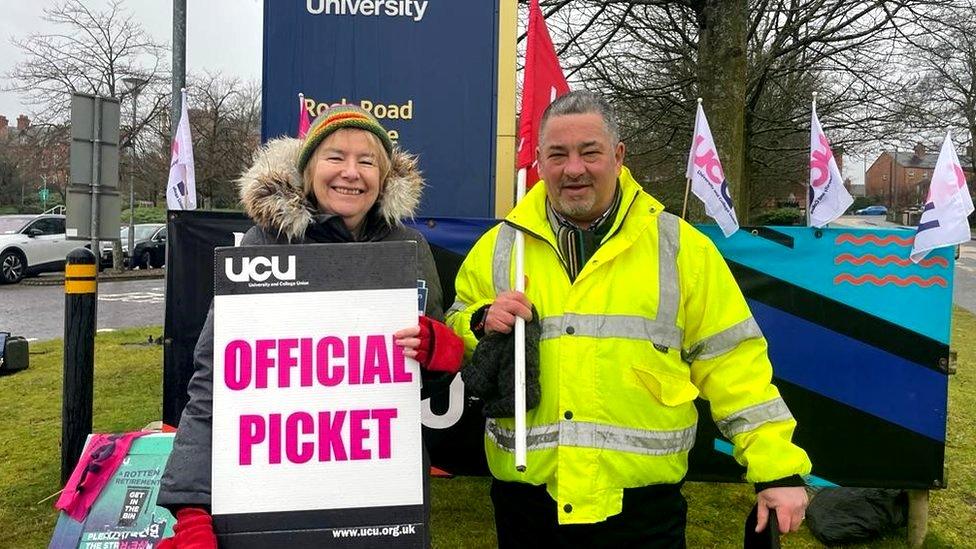
Below-inflation offer
Billy Scampton, who works as a technician at the university, said the latest pay offer was "not enough" and says that overall, their pay has gradually fallen since 2010.
There have been recent talks between the union and the University and Colleges Employers Association (UCEA) over pay but no agreement was reached.
The UCEA, which represents 144 Higher Education institutions across the UK including QUB and UU, said they had made the union a "full and final pay offer of between 5% and 8%".
"This offer prioritises the disproportionate effect of high inflation falling on the lower paid but still with a minimum of 5% for all other members of staff," the UCEA said.
But the UCU said the offer was not enough and called for a "meaningful pay rise to help staff deal with the cost-of-living crisis".
The union's branch at QUB also said the pay offer was well below the current inflation rate of more than 10%.
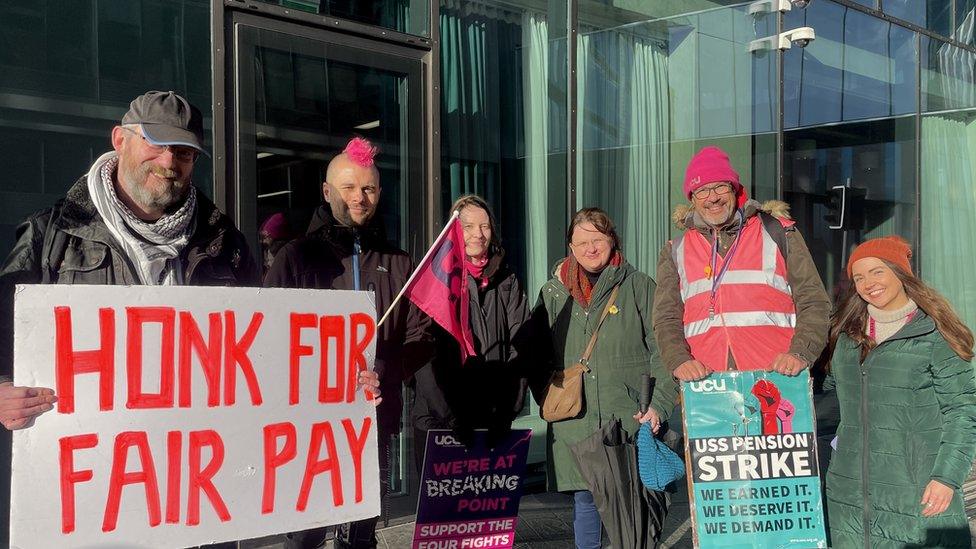
The dispute between the UCU and university employers has been a long-running one
Queen's University Branch President, Prof Sean O'Connell, said staff in universities had faced years of real-terms pay cuts and "rampant casualisation in higher education".
"We have people being paid very low payments for those casualised contracts and we have damaging workloads that are making people unwell."
'Big fees'
The history professor added that the aim of the strike was to put "pressure" on the 150 university vice-chancellors across the UK.
"Those 150 people are paid £44m per year. For that amount of money, I'd expect one of those 150 to have a bright idea or two and bring that to the table," he said.
In respect of the impact on students' education, Prof O'Connell argued that poor working conditions negatively affect teaching standards and students were already "paying big fees to get that kind of substandard service".
"Broadly they support us," he added.
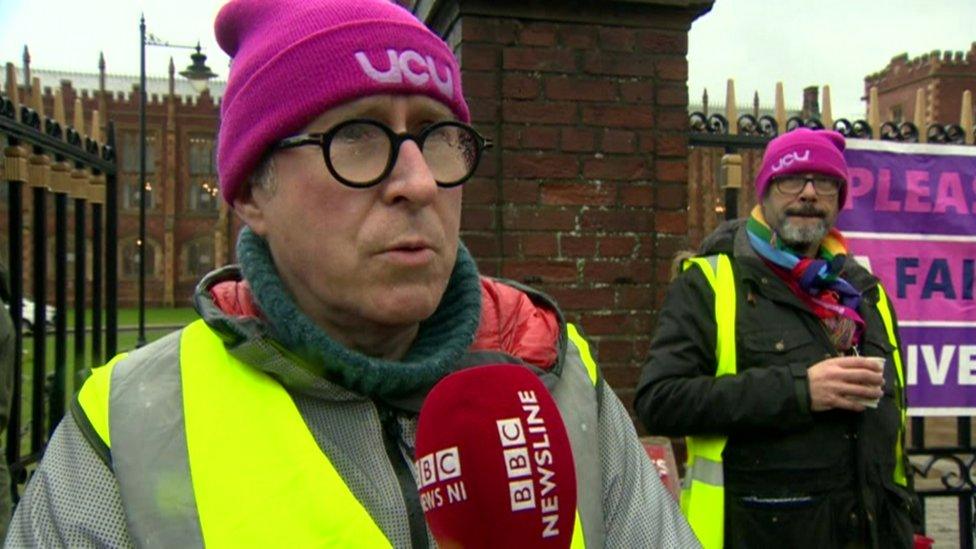
Prof Sean O'Connell said there would be more strikes unless management made "some serious offers" to address pay problems
Prof Dominic Bryan told BBC News NI that said Unite members in the university were also on strike.
After Wednesday, further UCU walkouts are due to take place on Thursday 9 and Friday 10 February.
UCU members would then strike again on 14, 15, 16, 21, 22, 23, 27 and 28 February.
There would be further action on Wednesday 1 and Thursday 2 March, and then later in the month on 16,17, 20, 21 and 22 March.
'Missed learning'
Queen's Students' Union Council - a group of students elected to represent the university's student population - recently voted to support UCU's industrial action.
Some of its members joined the picket line in Belfast on Wednesday morning.
"We're out in solidarity with UCU and Unite today. It's really important that lecturers at Queen's have proper working conditions, pay conditions," one student union representative told the BBC.
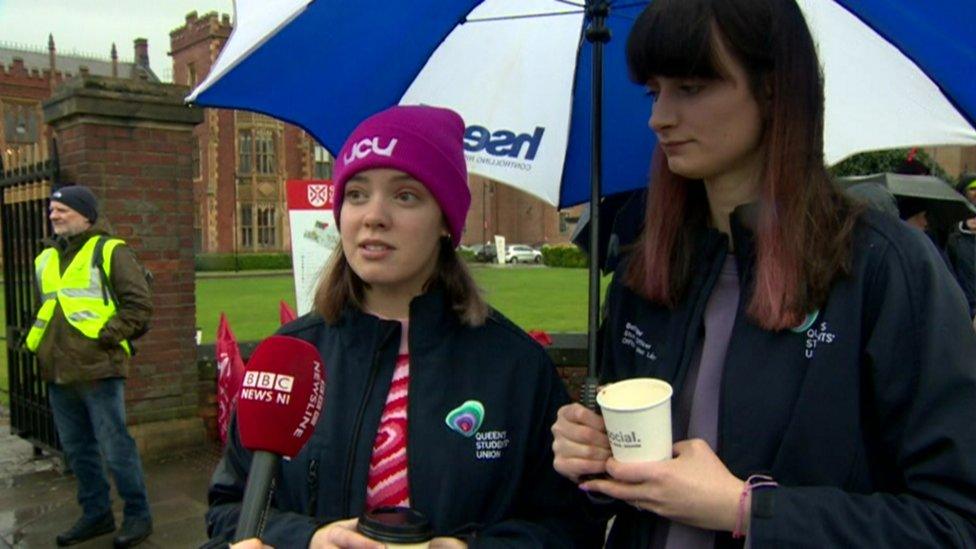
Queen's Students' Union representatives said students supported the strike
"We fully realise that some students will be really impacted by the days of missed learning," she added.
"We're working with the university to try and mitigate that, so they are not assess on topics that they'd be missing."
'National dispute'
A spokesperson for Queen's University said: "This is primarily a national dispute that the university cannot resolve unilaterally.
"Queen's will continue to use its influence to shape and inform the national debate and remains committed to working in partnership with all trade unions at a local level.
"We will be taking all necessary steps to minimise the impact of industrial action on the quality of services and support provided to our students and other stakeholders."
- Published1 February 2023
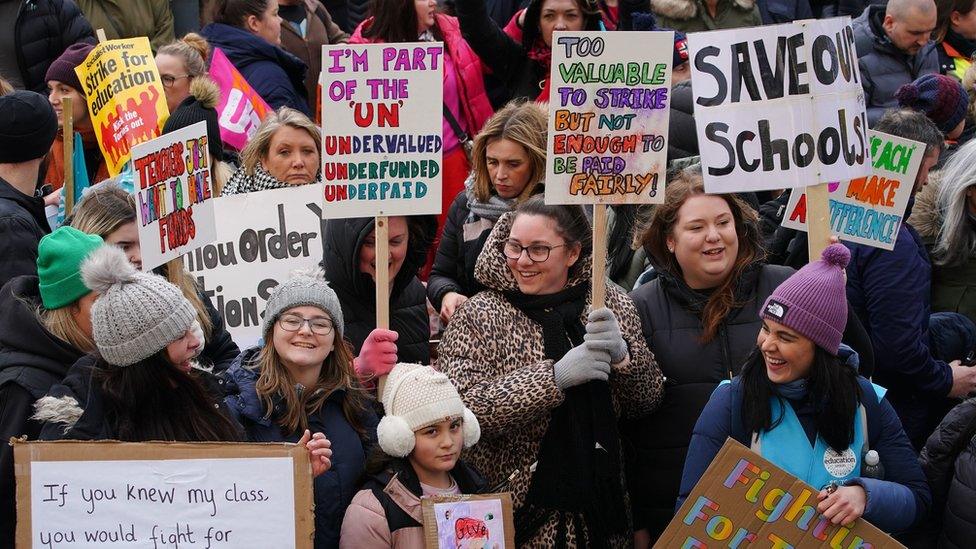
- Published25 January 2023

- Published24 November 2022
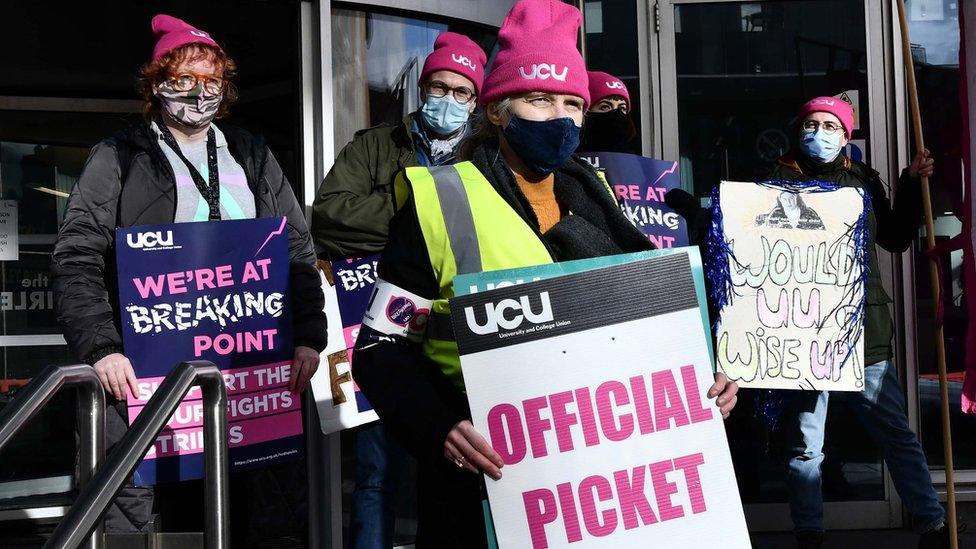
- Published9 November 2022
